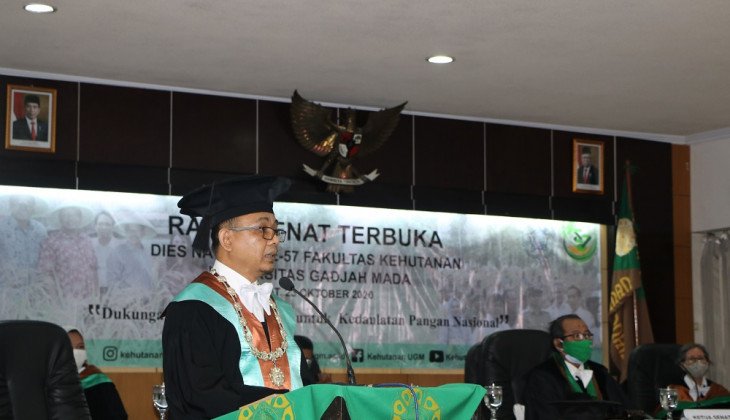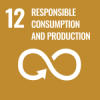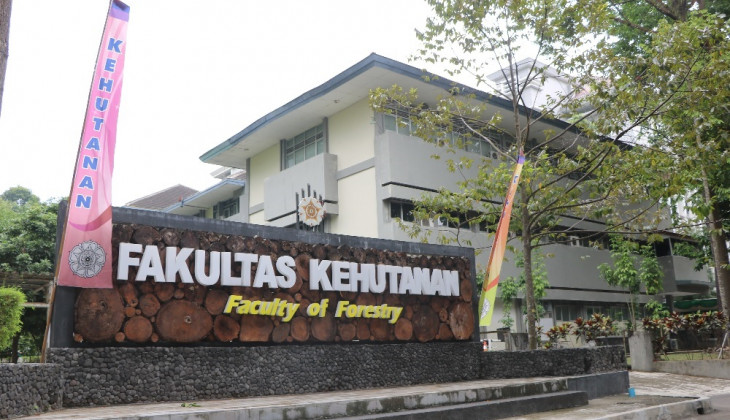
Faculty of Forestry UGM encourages integrated forest farming system (IFFS) technology to solve poverty problems in forest villages in Java.
“The government’s policy to build a food barn/food estate which should be implemented on unproductive forest lands should be able to adopt the technology in IIFS. It definitely should be following the sustainable landscape arrangement,” he explained in the peak event of the 75th Anniversary of the Faculty of Forestry UGM on Friday (23/10). The anniversary event’s peak was held offline, with a limited number of participants implementing health protocols. It also broadcasted live via the Youtube platform of Forestry UGM.
Throughout the IIFS concept with the application of intensive agroforestry, which the UGM Faculty of Forestry launched, it is proposed to attain the goal of food production and preserve a balanced forest function. These efforts also aimed not only to solve poverty in villages around the forest but also to accelerate forest rehabilitation. UGM had implemented this technology in the Special Purpose Forest Area (KHDTK) UGM in Getas and Ngandong covering 10,901 hectares.
In his speech, while delivering the Annual Report of the Dean of Faculty of Forestry UGM, Budiadi admitted that he had provided several input points to the government regarding the Omnibus Law on Job Creation. Among other things, preparing a study team related to the sustainability and integration of natural resources, forestry carrying capacity, and eliminating the minimum forest cover area of 30 percent of the watershed or island territory.
“There must be a national agreement that forests are not goods and services that produce the major economy, but as controlling goods and producing ecosystem services. There needs to be an escort in the formulation of the derivative of the Job Creation Law, both government regulations and at the ministerial level,” he emphasized.
Budiadi also revealed some developments and achievements made by the Faculty of Forestry in the past year from various fields. One of them is in the field of education. He said that the undergraduate, postgraduate and doctoral programs of the Faculty of Forestry UGM had received national recognition, namely obtaining accreditation A from BAN-PT. ASIIN also gained recognition on the global stage. Meanwhile, the undergraduate program is currently in the process of applying for ASIIN accreditation.
Furthermore, in the track of publication, there was a significant improvement from the previous year. The cumulative number of publications, including patents and copyrights in 2020, reached 183 copies. The addition of 30 percent from 2019 cannot be separated from university-level support in the form of launch programs such as the Final Project Recognition program.
Budiadi said that during the Covid-19 pandemic, he continued to keep implementing tri dharma tasks with regulations to health protocols. Besides, following the academic calendar for the emergency period in educational services and teaching and learning activities.
After the Dean’s Annual Report’s submission, there was also a scientific oration delivered by the Minister of Defense of the Republic of Indonesia, Prabowo. In his speech, Prabowo revealed the vital role of the forestry sector in national security. There must be collective efforts to meet food needs and create food security, food resilience, especially food sovereignty.
Hence, all parties must take a stand for national food sovereignty. Besides, there must be some supports from other parties such as the programs, support from sufficient land resources, strong human resources, and support from science and technology.
“We never want our country to fluctuate because of food scarcity, so all parties must take a role in the national food sovereignty,” he explained.
He also expects that the Faculty of Forestry UGM can play an active role in optimizing the forestry sector to achieve one of the food sector’s national strategic goals. Hence, the Faculty of Forestry UGM should strengthen forest management, cultivation, and forest technology while still prioritizing forest conservation to support the national food sovereignty program.



